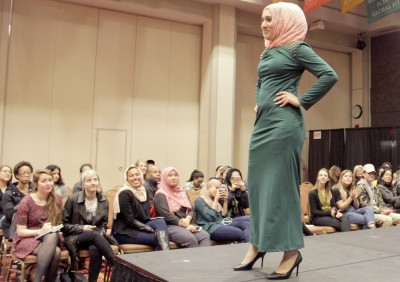
The Islamic Society of BU held a fashion show and panel discussion in Metcalf Hall Monday evening to highlight modesty, identity and public pe rception of Muslim-American clothing. PHOTO COURTESY ISLAMIC SOCIETY OF BU
Boston University's Institute for the Study of Muslim Societies and Civilizations and the Islamic Society of BU recently worked together to stage a panel discussion and runway show related to issues in modern Muslim-American fashion. The event, which took place Monday in Metcalf Hall, centered on themes of identity, self-expression, modesty and public perceptions of Muslim-American women.
A panel discussion kicked things off for about 100 attendees and featured four accomplished Muslim-American women: Layla Shaikley, an entrepreneur, former NASA intern and co-producer of the "Somewhere In America #MIPSTERZ" video on YouTube; Malika Bilal, an international journalist; and Amirah Aulaqi, a designer, entrepreneur and founder of the Amirah Couture fashion label. Noora Lori, a professor in the Frederick S. Pardee School of Global Studies, moderated the discussion.
"To talk about fashion and hijab in this really lighthearted way is really exciting," Lori told The Daily Free Press. "This is really about being Muslim American and wearing the hijab, and what that means for public perception and the way you carry yourself, but also what fashion means to you as a woman and your expression and sense of self."
Mikaela Ringquist, assistant director of the Institute, said the motivation behind focusing the event on fashion was to change the common Western narrative surrounding what Muslim women wear.
"I do think that often in this kind of narrative of 'Islam versus the West,' the way Muslim women dress is kind of used as the typical case to say, 'Look at how they make their women dress,'" Ringquist said. "I think we just wanted to give them the opportunity to speak for themselves, instead of having these talking heads on CNN and Fox News try to speak for them."
Ringquist's sentiment was shared by the panelists, who pointed out the narrow, monolithic narrative frequently ascribed to Muslim women in the United States.
"The popular narrative only represents us one way," Shaikley told the audience. "Muslim women in hijab are the most visible symbol of the Muslim faith at a time when it is incredibly misunderstood and misrepresented. There should multiple images of who a Muslim woman can be, not just one."
Shaikley recalled the mixed reaction she received after the "Muslim Hipsters" video went viral. The women portrayed in the video were often accused of being "not American enough" by American critics and were simultaneously told they weren't "real Muslims" by Muslim critics, she said.
The video was never meant to represent all Muslim women, Shaikley said. She explained that it was only meant to represent her personal experience, and the response the video received reveals the extent to which individual Muslim women are expected to represent the community at large.
The panelists also shared poignant stories about their relationships with their family, religion and fashion, and they reflected on their motivations for wearing a hijab.
"It wasn't because I understood what it meant," Aulaqi said of her decision to start wearing a hijab at eight years old. "My desire to wear it came from love, and came from beauty and a desire to emulate my mother. Before it became part of my religious identity, it was part of my American identity."
The women were quick to point out that every Muslim woman's relationship with her religion is extremely personal, as is her choice to wear or not wear hijab. This highlighted the diversity among Muslim women and how they choose to represent themselves.
"From a young age, I saw [the hijab] as beauty," Bilal said, recalling that as a child, she had often admired her mother and sisters' scarves. "It was something to attain."
A brief Q&A session followed the discussion, during which audience members asked the panelists questions before the event finished with a runway show featuring Aulaqi's designs.
Taiba Zahir, a junior in the Sargent College of Health and Rehabilitation Sciences, is just finishing her run as president of the Islamic Society of BU. Zahir emphasized the importance of fashion — so often considered a frivolous interest — in self-expression, both in her own life and for Muslim-American women in general.
"I feel like when people think of Muslim women, being fashion-forward or trendy seems to contradict that," Zahir told The Daily Free Press. "Being Muslim-Americans — being American but still being close to your religion — those identities are not mutually exclusive. Fashion is a fun topic, but it brings up a lot of other things that you can talk about, especially for Muslim-American women."
Zahir was one of six models to walk the runway Monday night in an Amirah Couture piece. Aulaqi's designs featured more modest silhouettes than that of popular Western trends. They sported sparkling embellishments, vivid colors and patterns and breezy, flowing fabrics. Models on the runway were greeted with cheers and applause from the audience.
"I think it was extremely successful," Zahir said after the event. "We got a diverse crowd, a very diverse crowd, and I'm so happy about that. I think it went exactly how we hoped."










